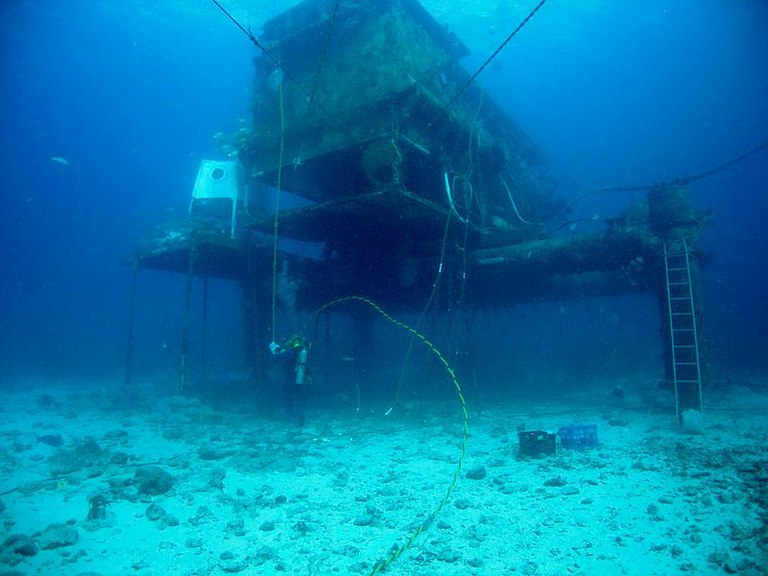FIU to operate Aquarius Reef Base
Unique underwater research lab to complement research and teaching
MIAMI (Jan. 15, 2013) — Florida International University has been awarded a grant to continue stewardship of the Aquarius Reef Base, the world’s only operational underwater research center.
As a member of the Cooperative Institute for Marine and Atmospheric Science CIMAS, FIU received a grant to continue maintenance and monitoring of the facility for NOAA in 2013. This will enable FIU to develop a new business model to fund operations at Aquarius. NOAA’s National Undersea Research Program, including Aquarius, was not included in the president’s fiscal 2013 proposal, however, NOAA recognizes that the Aquarius Reef Base is a unique and valuable asset to the scientific community. The new business model would include research and education activities supported by federal, state and local government funding, as well as fees for services from science and engineering teams from government and industry that use the facility. Donations from private benefactors also will be key to ensuring the future of Aquarius. A photo of Aquarius can be found here.
“Aquarius offers tremendous research opportunities, and we’re ensuring that the investment of American taxpayers continues to provide critical research results to the country,” said Mike Heithaus, executive director of FIU’s School of Environment, Arts and Society (SEAS). “For our students and our marine sciences program Aquarius offers fantastic new possibilities and is a natural fit for the work we are doing in the Keys and throughout the world.”
FIU biology professor Jim Fourqurean is the director of the Marine Education and Research Initiative for the Florida Keys in SEAS, and he will be overseeing activities at Aquarius Reef Base. The existing Aquarius team will become FIU employees.
“Rapid changes in the environment that supports the beauty and economy of South Florida make the observation post of Aquarius even more important,” said Fourqurean. “It gives us a unique vantage point to understand how changing climate, fishing pressure and threats from pollution and oil and gas exploration and production will impact our coastal environment.”
Aquarius provides unparalleled means to study coral reefs and the ocean, test state-of-the-art undersea technology, train specialized divers, and to engage the imagination of students and the public across the globe in ocean science, coral reefs, conservation, and underwater technology. The undersea lab even offers training opportunities for astronauts headed to space.
“Living and working in Aquarius is perhaps the closest thing on earth to actually being in space,” said William L. Todd, program manager for Exploration Analogs at NASA’s Johnson Space Center.
Todd commanded the first-ever NASA Extreme Environment Mission Operations (NEEMO) at Aquarius in 2001. NEEMO is a joint NASA-NOAA program to study human survival in the underwater laboratory in preparation for future space exploration.
“Aquarius allows our astronauts to conduct unique undersea missions that closely resemble the tasks, timelines, operations and even spacewalks that will be conducted on long duration space missions,” Todd said.
About Aquarius:
Situated 63 feet below the surface a few miles off Key Largo, Aquarius provides about 400 square feet of living and research space and allows scientists to live and work underwater 24 hours a day for one or two week missions. The prolonged access to the seabed allows scientists to intimately study the animals and plants that reside within and around the reef. Scientists have embarked on more than 300 science, exploration and training missions to Aquarius since its deployment in November, 1993, resulting in hundreds of published papers about a wide range of topics — from the biology of corals to global issues including the overall health of the oceans. As many as 117 missions involved residency in the Aquarius undersea laboratory since its initial deployment in the Florida Keys.
About FIU:
Florida International University is recognized by the Carnegie Foundation as a community engaged university. Its colleges and schoolshttp://main.fiu.edu/academics/colleges-schools/index.htmloffer more than 180 bachelor’s, master’s and doctoralhttp://main.fiu.edu/academics/degree-programs/index.htmlprograms in fields such as engineering, international relations, architecture, law and medicine. As one of South Florida’s anchor institutions, FIU is Worlds Ahead in its local and global engagement, finding solutions to the most challenging problems of our time. FIU emphasizes research as a major component of its mission. It has 160,000 alumni and enrolls 50,000 students on two campuses and three centers including FIU Downtown on Brickell and the Miami Beach Urban Studios. FIU is a member of the Sun Belt Conferencehttp://www.fiusports.comand has 400 student-athletes participating in 18 sports. For more information about FIU, visit http://www.fiu.edu.











0 Comments